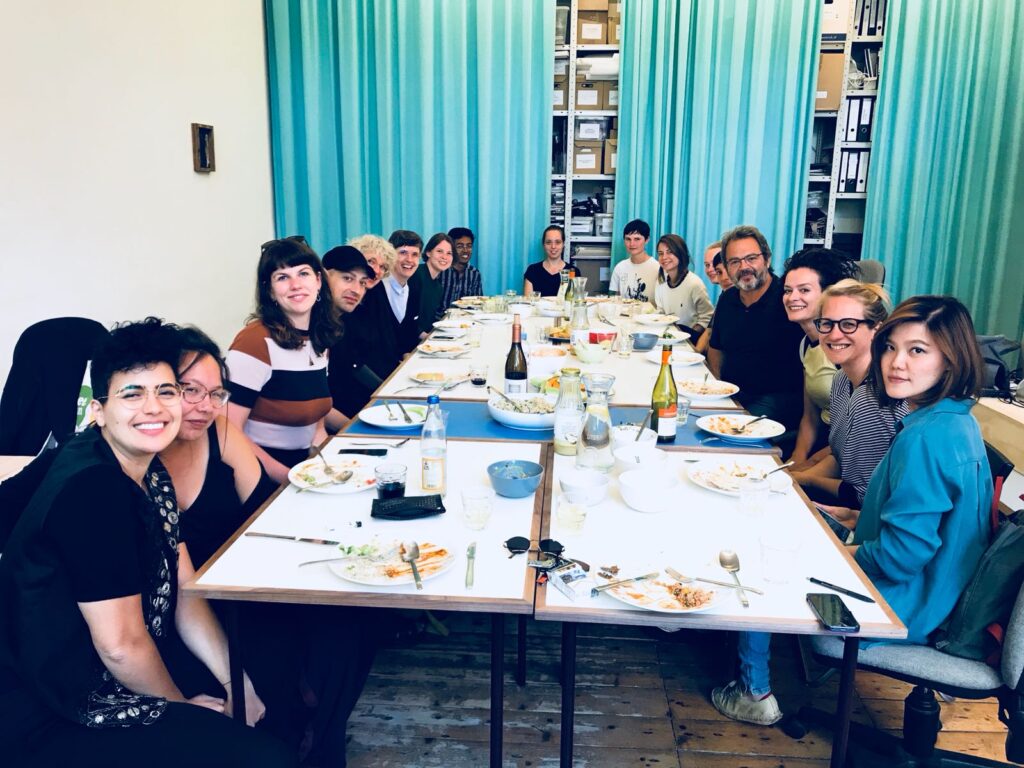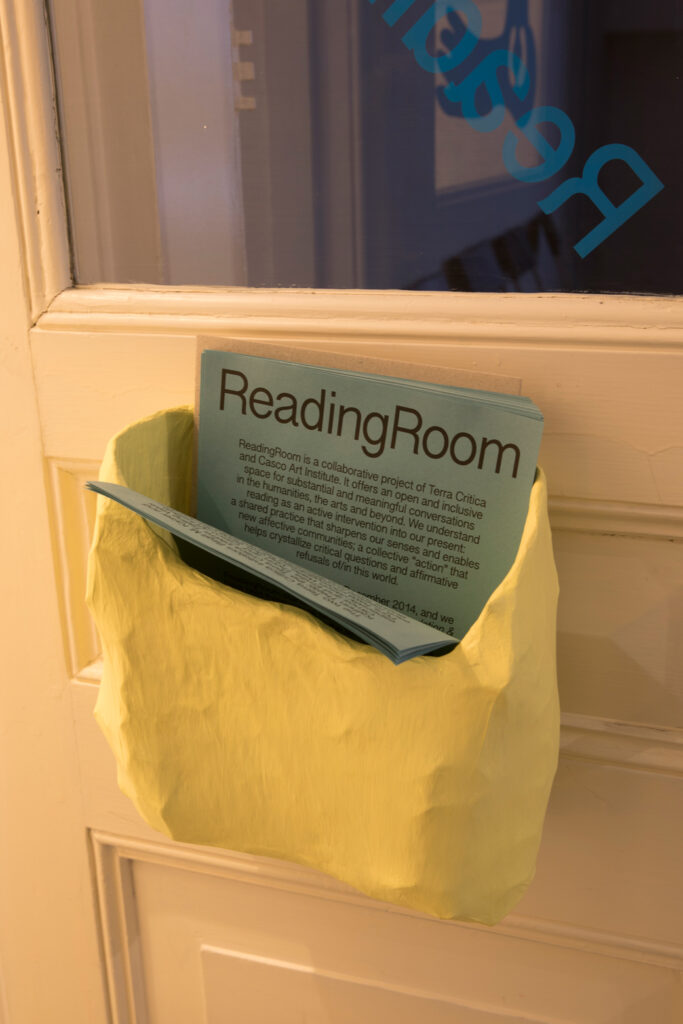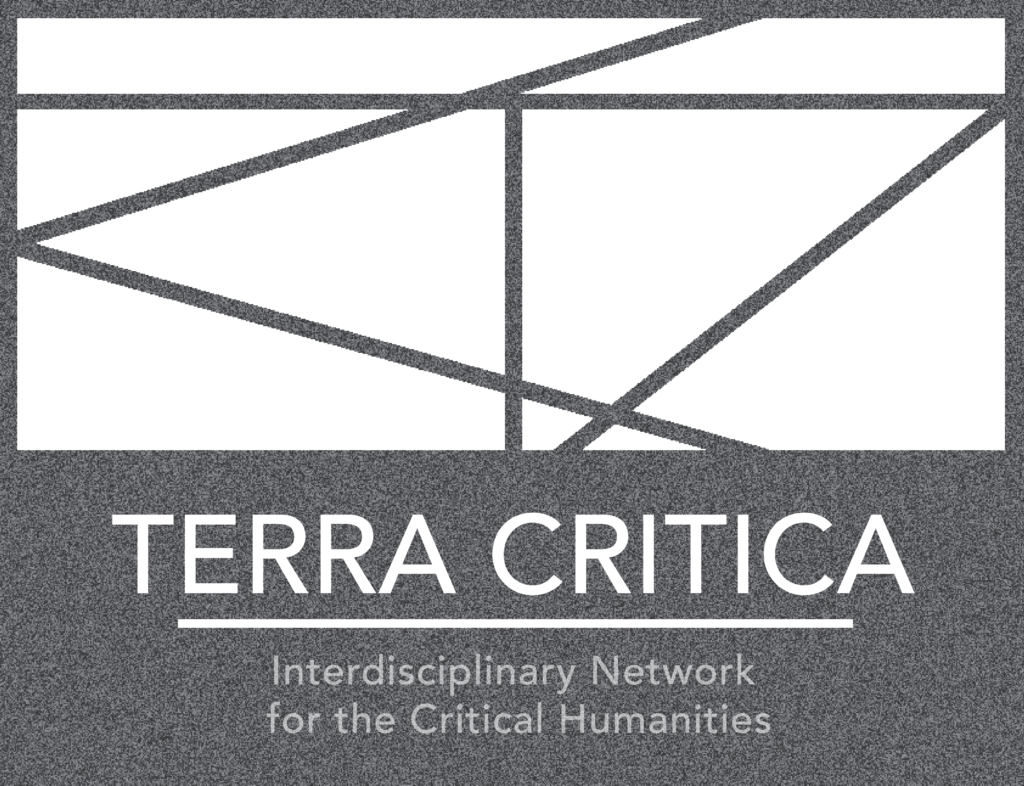ReadingRoom is open to anyone interested in careful close readings. It strives to create an open and inclusive space for substantial and meaningful conversations in the humanities, the arts and beyond. We are convinced that reading can help crystallize our critical questions. What are we driven by? What are we striving for? Who are “we”? Together, in the shifting constellations of ReadingRoom, where new people join each time while also many return regularly, we can refine those questions and sharpen our understanding of this world, our practicing in this world. In that sense, reading is an active intervention into our present, a shared practice that sharpens our senses and enables new affective communities.
ReadingRoom holds one thematic series per year, with 4-6 meetings per series. Each time we base our conversations on a few key texts from a wide range of disciplines. Over the course of 2019, ReadingRoom also issued four installments of a newsletter, each collecting our thoughts and questions after a session. The newsletters are published in issue # 11 of the Journal of Aesthetics & Protest. By clicking on the following links, you can also find the individual newsletters we made: #1 April 2019, #2 June 2019, #3 October 2019 and #4 November 2019.

The eighth series of ReadingRoom was running in spring and summer 2023 and picked up earlier concerns with CPC, the capitalist-patriarchal-colonial formation and its ecological devastation. The first session (April 2023) concentrated on a publication by the Earth4All initiative, entitled Earth for All: A Survival Guide for Humanity (September 2022), by Sandrine Dixson-Declève, Owen Gaffney, Jayati Ghosh, Jorgen Randers, Johan Rockström and Per Espen Stoknes. It is the most recent report to the Club of Rome, fifty years after its famous The Limits of Growth (1972). As development economist Jayati Ghosh said at the recent World Economic Forum in Davos in January 2023, “skyrocketing wealth and income inequality” are still at the root of today’s global polycrisis. And, as the open letter of the Earth4All initiative’s Transformational Economics Commission to “world leaders” holds: “Despite the fact the world is in a climate emergency, the richest 1%— over 80 million people — are the fastest-growing source of emissions by far” – which means that “every single month the world burns through 1% of the remaining carbon budget for any hope of stabilising climate at 1.5°C” and that most people are “kept in a state of economic insecurity”, despite the world being wealthier than ever before (see https://www.earth4all.life/open-letter-davos-tax). We asked ourselves what we can learn from Earth for All. What insights the analyses does it offer, but also which questions or hesitations do their suggestions generate?
*
The seventh series of ReadingRoom was running from November 2021 to March 2022, entitled Going Viral; or what just happenend? ReadingRoom had been interrupted by Covid-19 in March 2020 and given the unprecedented circumstances of the global pandemic, this series wanted to resist the urge to move forward and ‘past’ things all too quickly and rather offer space to reflect together on what happened. How to think-read-feel together about the experiences of loss and change during the pandemic? About our diverging efforts of digesting those experiences? How to find ways of collective grieving and working through? The series ran for only two sessions, again complicated by Covid-19. Session One (November 2021) was based on Laurent Berlant’s Cruel Optimism (2011) and Berlant’s text helped us think about affect, public space, optimism and situations of crisis. By engaging with their work, we also commemorated the loss of this wonderful thinker. Session Two (March 2022) engaged with Douglas Crimp’s piece “Mourning and Militancy” (October, vol 51, 1989).
*
The sixth series of ReadingRoom was running from October 2019 to January 2020, entitled It is Time... and continued to study CPC (fifth series) to considered how we can thread a critique of the on-going environmental destruction into our critical understanding of it. Among other things, we read together Isabelle Stengers’ In Catastrophic Times. Resisting the Coming Barbarism (2015); Déborah Danowski & Eduardo Viveiros de Castro, The Ends of the World (2017); Amitav Ghosh, The Great Derangement. Climate Change and the Unthinkable (2016) and Dipesh Chakrabarty, “Anthropocene Time” History and Theory 57/1 (2018). In a last, memorable session before the series was interrupted by the Covid-pandemic, we read Octavia Butler’s dystopian sci-fi novel Parable of the Sower (1993), set in the 2020s, the very decade we entered in January 2020. It is Time… to re-imagine futurity (or temporality itself), to invent new languages to speak different ecologies of living.
In November 2019, ReadingRoom hosted a guest session at BAK, basis voor aktuele kunst in Utrecht, as part of BAK’s Program Trainings for the Not-Yet.

*
The fifth series of ReadingRoom was running from October 2018 to June 2019, entitled Reading Rosa, pink & other colors. It studied the interlocking systems of capitalism – patriarchy – colonialism, which we dubbed CPC. As this series coincided with the centennial of Rosa Luxemburg’s violent death in 1919, we started with her analysis of how a capitalist economy cannot sustain itself without simultaneous colonial expansion as well as a patriarchal societal foundation (October 2018). Moving forward and backward in time, the series then looked into Black feminist critiques of CPC as well as “the family” as one of its incubators. Among other things, we read together poems from Koleka Putuma’s Collective Amnesia (2017); parts from Anna Julia Cooper’s A Voice from the South (1892), Denise Ferreira da Silva’s “Fractal thinking” (2016); Karen Barad’s “Troubling time/s and ecologies of nothingness: re-turning, re-membering, and facing the incalculable” New Formations 92 (2017): 56-86; excerpts from Silvia Federici’s Revolution at Point Zero (2012) and Audre Lorde’s “Age Race Class and Sex” from Sister Outsider (1984). Our fifth series resonated with Casco’s exhibition Terre Thaemlitz: Two Rubatos (8 March – 12 May 2019) and Terre Thaemlitz joined us for our session in April 2019.
In May 2019, ReadingRoom hosted a guest session at SALT Beyoglu Istanbul in collaboration with Bogaziçi University, Istanbul and the international conference ‘Eco-Ethical Encounters’.
*
The fourth series of ReadingRoom was running from February to June 2018, discussing un/learning: the p/re/distribution of knowledge. This series asked how we host, organize and maintain knowledge and, more broadly, took up questions concerning access to, institutionalization of and the distribution of knowledge in its many forms. Among other things, we read together “Critique as Unlearning” by Sreshta Rit Premnath (2016), “An Interview with Gayatri Chakravorty Spivak” by Sara Danius, Stefan Jonsson, and Gayatri Chakravorty Spivak (1993); parts of Jacques Rancière, The Ignorant Schoolmaster: Five Lessons in Intellectual Emancipation (1991); Journey to Mount Tamailpais (1986) by Etel Adnan and Marisol de la Cadena’s Earth Beings. Ecologies of Practice Across Andean Worlds (2015). For our session in June 2018, Ghassan Hage joined us as special guest. This series was in part inspired by the exhibition The Library of Unread Books by Heman Chong and Renée Staal at Casco Art Institute (26 November 2017 – 25 February 2018).
*
The third series of ReadingRoom was running from September 2016 until May 2017, discussing WHO CARES? Politics and Poetics in the Affirmative. We studied feminist, decolonial and aesthetic interventions ‘in the affirmative’ into our contemporary planetary situation – especially looking at alternative spaces of education, activism and art and pursuing affirmation as a promising poetico-political tool to pass from mere opposition and negation to space-opening refusal. In the first session (September 2016), we read Aimé Césaire’s “Poetry and Knowledge” (1948); Fred Moten and Stefano Harney’s “The University and The Undercommons” (2013); Achille Mbembe’s “Decolonizing the University” (2016). This series saw a lot of special guests: in Nov 2016, the film makers Silvia Maglioni & Graeme Thomson screened their Facs of Life(2009); in December 2016, Alex Martinis Roe joined us; in February 2017, we engaged with decolonial critiques of modernity with Rolando Vázquez Melken and in April 2017, we welcomed Natasha Myers, reading together Anna L. Tsing’s The Mushroom at the End of the World: On the Possibility of Life in Capitalist Ruins (2015) and Leanne Betasamosake Simpson’s “Land as Pedagogy: Nishnaabeg Intelligence and Rebellious Transformation” from Decolonization: Indigeneity, Education & Society (2014).

*
The second series of ReadingRoom was running from September 2015 to February 2016, discussing relationality – envisioning new wor(l)dings. Relationality as one of the fundamental conditions of critical assessment and intervention has been theorized in Caribbean thought and poetics. During a first session (October 2015), we therefore read Édouard Glissant’s Poetics of Relation (1990). We also screened Manthia Diawara’s documentary on Glissant, One World in Relation (2010) and Odile Ferly joined us as special guest. We continued with texts by Frantz Fanon and Sylvia Wynter, especially parts from Fanon’s Toward the African Revolution (1964), Wynter’s “Unsettling the Coloniality of Being/Power/Truth/Freedom: Towards the Human, After Man, its Overrepresentation – an Argument” (2003) and her interview with David Scott “The Re-Enchantment of Humanism: An Interview with Sylvia Wynter” (2000). For the last session (February 2016), Denise Ferreira da Silva and Wendelien van Oldenborgh joined us, and we screened van Oldenborgh’s experimental film production From Left to Night (2015).
*
The first series of ReadingRoom was running from December 2014 to May 2015, discussing speculation & fabulation – critique in the SF mode. We looked at the theory and diverse forms of science fiction, reinvesting in imagination and speculation as crucial affective-critical tools for our present. Our first session (December 2014) was a “seeance” led by filmmakers Graeme Thomson & Silvia Maglioni on Félix Guattari’s unfilmed sci-fi screenplay Un Amour d’UIQ. Next to Maglioni & Thompson, this series welcomed several other special guests: in January 2015, visual artist Melanie Gilligan guided us through their exhibition ‘The Common Sense’, a sci-fi mini-series screened at Casco which examines how minds, bodies, and interpersonal relations are shaped by technological advancements within capitalism; in May 2015, artist Adelita Husni-Bey joined for a discussion of Hélène Cixous and Clarice Lispector, at the occasion of their Casco exhibition ‘White Paper’; and in May 2015, we discussed speculative feminist utopias with Jennifer Wagner-Lawlor, reading Jeannette Winterson’s The Stone Gods (2007) and parts from Wagner-Lawlor’s Postmodern Utopias and Feminist Fictions (2013).
*
ReadingRoom participated in the exhibition @ Casco titled Casco Art Institute: Working for the Commons, which ran from Friday 26 May 2017 and through until 16 July 2017. To learn more about this project please click here.
ReadingRoom has received financial supported from the national research schools of Gender Studies (NOG) and Literary Studies (OSL) and by Aspasiagelden Diversiteitsbeleid.



